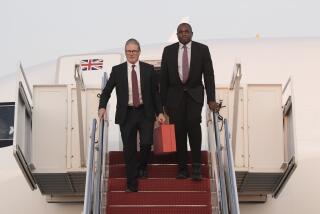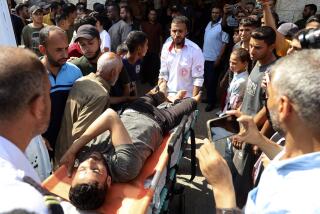U.S. Discusses With Allies New Ways to Punish Iraq
WASHINGTON — The Bush Administration, encouraged by an international backlash against raids by Iraqi troops on Western diplomatic compounds in Kuwait, said Saturday that it is discussing with other countries new ways to punish the Baghdad regime for its actions.
“We continue to consult with France and our other friends on further possible steps to bring home to Iraq the costs of its aggression, including tightening of the sanctions in all possible ways,” the White House said in a statement.
Although White House spokesman Sean Walsh declined to elaborate, analysts said the discussions are likely to include a proposal by French President Francois Mitterrand to impose an air blockade against Iraq. Another possibility would involve some form of sanctions against nations that help Iraq evade the international embargo.
The White House statement came as the U.N. Security Council, at France’s request, prepared for an emergency session in response to the forcible entry of Iraqi troops at the French, Canadian and Belgian embassy compounds on Friday and at the Netherlands compound earlier last week.
Meanwhile, U.S. officials delivered to Iraq a videotape in which President Bush offers his view of the Persian Gulf conflict to the Iraqi public.
The Administration also tried to resolve internal differences on the scope of a proposed sale of U.S. arms, possibly worth as much as $23 billion, to Saudi Arabia.
A planeload of 285 former U.S. and Canadian hostages arrived at Baltimore-Washington International Airport. Among those aboard was a 25-year-old bank employee who was released after his mother sent a personal plea to Iraqi President Saddam Hussein.
A flight carrying a second group of former hostages is scheduled to arrive at the airport today.
White House officials, seeking to stress the international opposition to Iraq’s Aug. 2 invasion of Kuwait, strongly approved of France’s decision to add 4,000 soldiers to the defense forces in the Persian Gulf and to evict from Paris Iraq’s military attaches and other Iraqi personnel.
“We welcome France’s decision to contribute substantial additional forces, including ground troops, to the international effort in the gulf,” the White House said in its statement. “This decision is further evidence of the determined and unified international will to resist Iraq’s blatant aggression and violations of international law.”
President Bush spent the day at his mountain retreat at Camp David, Md., where he signed into law a bill authorizing an expansion of the nation’s strategic petroleum reserve to 1 billion barrels from its current cap of 750 million barrels. The law allows the government to lease crude oil from producers and keeps the reserve in operation for four more years.
One day after Iraqi troops in Kuwait forced their way into diplomatic compounds of France, Canada and Belgium, a group of about eight diplomatic personnel remained inside the U.S. Embassy in Kuwait city without electricity and cut off from outside supplies. State Department spokesman Mark Dillon said their situation has not changed. Despite the continuing presence of Iraqi soldiers outside, there was no word of any advances on the American compound, Dillon said.
The Administration, meanwhile, was preparing to submit to Congress an extraordinary list of weapons it wants to sell to Saudi Arabia, including F-15 fighter planes, tanks and other sophisticated arms to bolster the kingdom’s long-term security.
White House spokesman Walsh said the arms sale proposal is being worked on by a task force of representatives from the Defense, State and Commerce departments and had not yet been forwarded to the White House. “They would all have their recommendations,” he said.
Earlier in the day, U.S. Embassy officials in Baghdad delivered the President’s videotaped message to the Iraqi public to Iraq’s undersecretary of foreign affairs, Nizar Hamdun. Iraq has promised that it will allow the tape to be broadcast on state-owned television, but the timing of the transmission is unclear.
“The U.S. has announced that if it’s not broadcast within five days, it will be released to the media,” said a spokesman for the State Department’s Kuwaiti Task Force.
The discussions involving further action against Iraq are expected to include a possible air blockade to prevent goods from entering or leaving Iraq by plane in violation of the international trade embargo. Both Libya and Yemen are believed to have allowed such flights.
An air blockade “is being debated now,” a senior Arab diplomat in Washington told The Times last week. While acknowledging that such an escalation of the trade embargo would involve potential dangers, the diplomat estimated that it would be effective in 8 out of 10 cases because many pilots would refrain from trying to evade an air blockade.
“Why? Because four of those eight won’t go because they know perhaps it’s dangerous,” he said. “And the other four, you can prohibit them in the airports if you can identify them, say, in the airports.”
The talk of tougher economic sanctions comes amid signs that the existing sanctions have been taking a toll. There were reports Saturday that Iraqi troops in Kuwait, short on food as a result of the embargo, have eaten many of the animals in the Kuwaiti zoo.
The White House also applauded recent announcements by France, Canada, Belgium, Italy and Britain that they will bolster their military forces in the Persian Gulf with additional combat troops, fighter planes, tanks and ships.
Citing the latest French deployments, the White House statement declared: “We consider such steps appropriate and justified in view of Iraq’s continued infringement of diplomatic conventions covering the presence of foreign embassies in Kuwait.”
More to Read
Sign up for Essential California
The most important California stories and recommendations in your inbox every morning.
You may occasionally receive promotional content from the Los Angeles Times.










